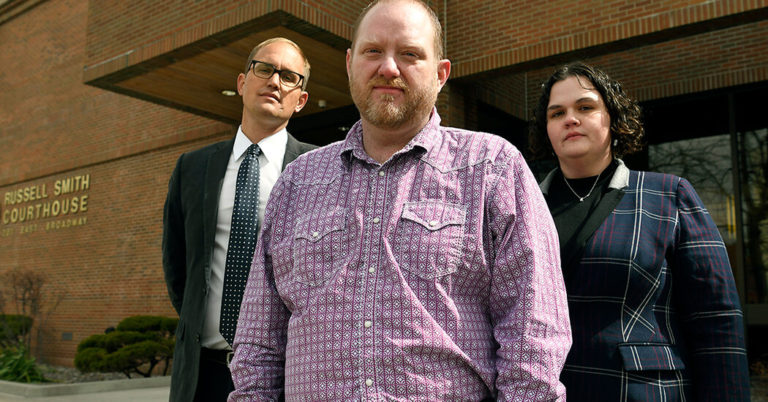

In 1993, when he was 18, Randall Menges had consensual sex with two other teenage boys at a camp in Idaho.
Mr. Menges was charged by state prosecutors with “crimes against nature” — a charge since ruled unconstitutional that was used to prosecute people who engaged in sodomy or oral sex — and served seven years in prison, according to federal court documents.
When he was released, he was placed on the sex-offender registry in Idaho and then in Montana, where he later moved. On Tuesday, a federal judge in Montana ruled that Mr. Menges’s name should be removed from the state’s sex-offender registry.
Mr. Menges, who has been rejected from jobs, lost friends and even contemplated suicide because of his status, said he cried when he was told about the decision. One of his lawyers, Elizabeth Ehert, said the ruling would allow him to rebuild a life that “has been utterly destroyed by the homophobic laws that made gay sex illegal.”
But his fight to remove himself from the list is not over.
Almost immediately after the ruling, the Montana attorney general, Austin Knudsen, a Republican, said he planned to appeal it.
In a statement, Emilee Cantrell, a spokeswoman for Mr. Knudsen, said the ruling “weakens our state’s sex-offender registry law, making kids and families less safe.”
“Montana law is clear: If you are required to register as a sex offender in another state, you must also register here,” she said.
Mr. Menges, 45, who lives in Butte, Mont., said in an interview that prosecutors were willing to “discard him so that they can have stronger laws.”
“It’s not that what I did was wrong,” he added.
Mr. Menges’s case reflects the longstanding questions about the effectiveness of sex-offender registries.
They were created to warn communities about sexual predators who have been released from prison, but they have been criticized by groups like the American Civil Liberties Union and criminologists for pushing people to the margins of society while doing little to keep the public safe.
The registry “thoroughly ruins someone’s life to the point that it almost discourages rehabilitation for some folks,” Mx. Ehret said. “But in Randy’s case it’s been more horrifying.”
Mr. Menges’s legal battle also comes amid a larger struggle over laws that have historically been used to discriminate against L.G.B.T.Q. people.
Many states, including Montana, eliminated broad laws against sodomy and oral sex in the 1990s. Then came the 2003 U.S. Supreme Court ruling that said such laws were unconstitutional and failed to recognize that same-sex couples were “entitled to respect for their private lives.”
Today, eight states still have anti-sodomy laws on the books but only three states — Idaho, Mississippi and South Carolina — have laws requiring sex offender registration for people convicted of sodomy, said Matthew Strugar, one of Mr. Menges’s lawyers.
Last September, Mr. Strugar, along with the A.C.L.U. of Idaho, filed a federal lawsuit challenging Idaho’s law on behalf of Mr. Menges and another man who was forced to register as a sex offender because he was convicted 20 years ago in another state for performing oral sex on his wife.
Prosecutors in Montana argued that until the Idaho case was resolved, Mr. Menges had no right to file a complaint in Montana.
But on Tuesday, Judge Dana L. Christensen, who was nominated by President Barack Obama, said that the Montana statute that required Mr. Menges to register as a sex offender had caused him “significant” hardships, like being denied housing and employment.
Judge Christensen said that the harm Mr. Menges suffered under Montana’s statute outweighed the public’s interest in keeping his name on the registry.
“Under Montana’s constitutional scheme, having consensual intimate sexual contact with a person of the same sex does not render someone a public safety threat to the community,” he wrote. “Law enforcement has no valid interest in keeping track of such persons’ whereabouts.”
The ruling applies only to Mr. Menges’s case, but Anthony Johnstone, a professor at the University of Montana Alexander Blewett III School of Law, said it could serve as a road map for people convicted under similar circumstances.
“The decision suggests that states cannot require sex-offender registration based on convictions under outdated and now unconstitutional ‘crimes against nature’ laws,” he said.
In 1993, Mr. Menges was living in a foster program at a ranch in Gem County and stayed on as an employee when he turned 18. Two months later, the police learned that he had had sex with two other teenagers, both 16, at the ranch. The age of consent in the state was 16.
“The Gem County police reports reflect that the sex was consensual,” according to Mr. Menges’s lawsuit. Still, he was charged with one count of a “crime against nature” and sentenced to five to 10 years in prison.
“I was in prison for something that I didn’t even realize or know was a crime,” Mr. Menges said.
When he was released, people inevitably found out he was on the registry. When he explained the circumstances behind his conviction, they did not believe him, Mr. Menges said.
“Everybody thought there had to be more to the story,” he said.
Mr. Menges said he had been shut out of homeless shelters and had to sleep on the streets.
Recently, a woman offered him a job transporting horses. He would have made nearly $100,000 a year, but she rescinded the offer after she found his name on the registry. Mr. Menges said she told him she was too worried about losing customers.
Except for his dog, Mr. Menges said that he had been “totally, literally alone.”
Mr. Menges said he hoped to be removed from the list so he can run his own business transporting horses.
“Being single and so used to being alone, it’s fine with me,” he said. “I’d rather be on the road in a truck with horses than living in a house, in a way.”